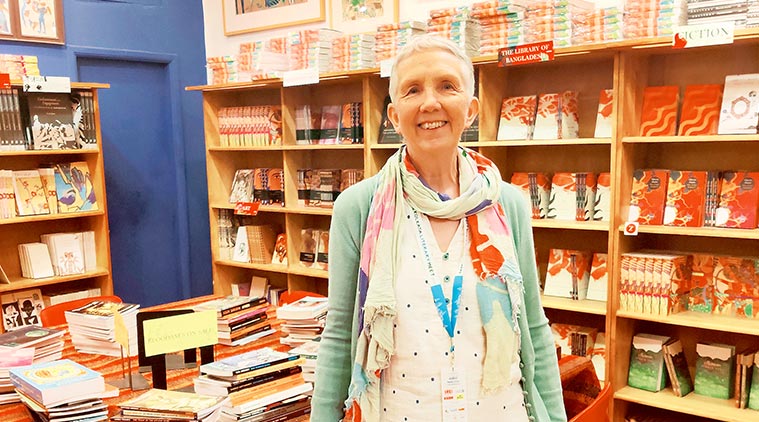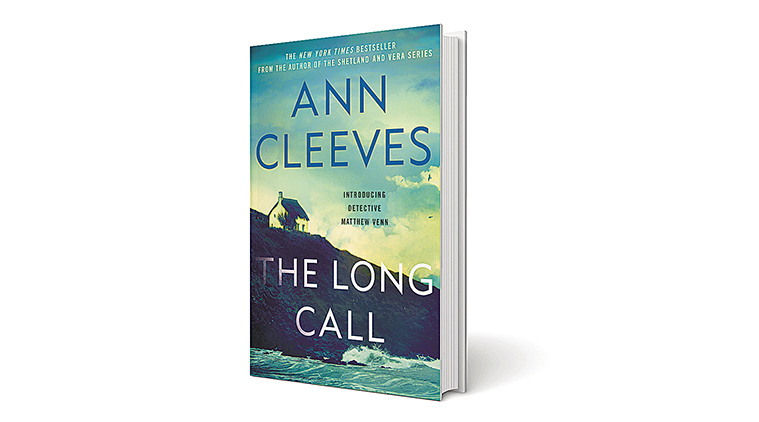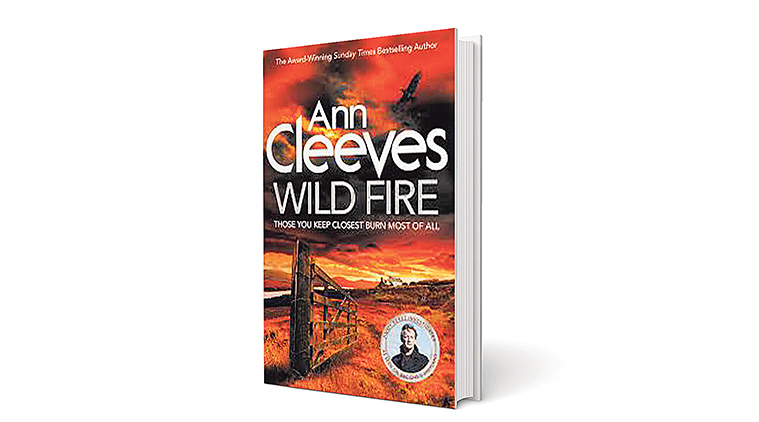 As the daughter of a village schoolteacher in rural England, Cleeves always felt like an outsider.
As the daughter of a village schoolteacher in rural England, Cleeves always felt like an outsider.
The car had broken down and it had been parked in the driveway outside Ann Cleeves’s house in Whitley Bay, Northumberland, for some time now — there was no money to get it fixed. Her husband Tim, a conservationist and bird watcher, worked for a charity, while she was employed at the local library and wrote in her spare time; running a household and raising two daughters on their meagre salaries often posed a challenge. One day, there was a letter in the post — it was from a publisher offering her a book deal for her crime novel, A Bird in Hand, along with a cheque for £500. “My first thought was that now we could mend the car,” says Cleeves, 65, a smile reaching her blue eyes, as she recalls that day in 1986 that had changed her life.
But not so dramatically, you know, she says. “From 1986 till 2006, for 20 years, I wasn’t paid an advance. I’d write the book first and then get paid,” says Cleeves. Publishers considered her a “mid-list author.” “That’s a euphemism for ‘bottom of the heap’. My books would make it to libraries but I was never going to sell in the major book chains,” she says. Without a marketing budget to bolster sales of her books, Cleeves continued to soldier on with her three principal characters, each having a series to themselves: George Palmer-Jones, Inspector Stephen Ramsay, and Vera Stanhope.
But in 2006, when she introduced Detective Jimmy Perez, the crime-fiction world sat up and took notice. That year, Raven Black, the first in the Shetland Island series, won the prestigious Duncan Lawrie Dagger Award for the best crime novel of the year. It was her 19th novel and one that forced her publishers to eat crow and publish her in the United States; translations into Swedish, German, Japanese and Korean followed. It’s taken 35 crime novels, and two popular TV adaptations of the Vera and the Shetland books for Cleeves to be recognised as one of British crime fiction’s most popular writers.
 Without a marketing budget to bolster sales of her books, Cleeves continued to soldier on with her three principal characters, each having a series to themselves: George Palmer-Jones, Inspector Stephen Ramsay, and Vera Stanhope.
Without a marketing budget to bolster sales of her books, Cleeves continued to soldier on with her three principal characters, each having a series to themselves: George Palmer-Jones, Inspector Stephen Ramsay, and Vera Stanhope.
Her earrings catch the light of the winter sun, high above our heads at the Zee Jaipur Literature Festival; Cleeves is wearing a pair that boasts of the cover of Agatha Christie’s Murder on the Orient Express (1934). For as long as she can remember, crime novels have offered her comfort as a reader: a crime would be followed by an investigation and then resolution; the order of events pleased her greatly. “But when I started writing, I thought I was going to write a great literary novel. But I couldn’t plot, I couldn’t work what would happen next — unless I killed somebody off,” says Cleeves.
For those of us who discovered Cleeves from the TV shows, especially Shetland, and proceeded to devour her books one by one, it’s been a rather surreal experience. The landscape in that particular show — cliffs overlooking the sea, wide swathes of slimly-populated land, birds tracing invisible routes in the grey skies — would give one the impression that Cleeves devoted large chunks of her writing to descriptions of the islands. It isn’t so — she displays remarkable economy when it comes to setting the stage. “One small detail can make a scene, a place and a character come alive. I think reading is a creative process. Part of what writers need to do is leave a gap in the narrative for readers to use their own imagination,” she says. After all, it’s a space she’s inhabited for as long as she can remember.
As the daughter of a village schoolteacher in rural England, Cleeves always felt like an outsider. “As a child, it was very difficult to always be looking in, wanting to belong and not being quite sure how,” she says. The family moved to north Devon when she was 11; when she moved to middle-school, her father was no longer teaching her and, for the first time, she made friends. “It was as though the sun came out. But that feeling of being an outsider would continue when I went to the University of Sussex — there were children of lawyers and bureaucrats and I didn’t fit in. I was reading English literature but I dropped out because I arrogantly thought that I could read books anywhere I wanted,” says Cleeves.
It was around that time that she met a scientist who was headed to the bird observatory in Shetland and the Fair isles. “I didn’t know where it was really, but he told me that they needed an assistant cook. I didn’t know anything about birds or cooking, but off I went,” says Cleeves, who met her husband, a visiting birdwatcher, in the first year. In some ways, you can tell you’re reading a Cleeves book if birds or bird watchers make their appearance early on in the narrative. “It’s osmosis, really, because I lived with somebody who had that passion for the natural world. It’s about the quiet observer, and that’s who I am — I love watching people. Environmentalists talk about ‘ground truthing’, surveying what’s there on the site before they make their theoretical observations. It works the same way for detection,” she says.
 Her latest creation, Matthew Venn, who heads her Two Rivers series, that debuted last year, is shy, perceptive and happens to be gay.
Her latest creation, Matthew Venn, who heads her Two Rivers series, that debuted last year, is shy, perceptive and happens to be gay.
As somebody who didn’t have the luxury of becoming a full-time writer before 2006, Cleeves worked a number of jobs after leaving Shetland, including one as a probation officer for four years in Merseyside. “I have met real murderers. Most of them were inadequate, pathetic little men, who weren’t entertaining or interesting enough to write about. What I did get out of it were conversations with the families of these men, about why they had committed these particular crimes,” she says. Cleeves’s detectives, like her, are interested in other people, and the worlds that surround them — they are rather ordinary in the sense that they don’t suffer from alcoholism, insomnia or rage. Her latest creation, Matthew Venn, who heads her Two Rivers series, that debuted last year, is shy, perceptive and happens to be gay. “My husband Tim died suddenly in 2017, and I escaped to north Devon because I couldn’t bear the sympathy of people. Friends of mine, a gay couple, whisked me away and they were wonderful to me — giving me a glass of wine when I needed it, leaving me alone when I wanted. So when I wrote The Long Call (Pan Macmillan), they were at the heart of the story,” says Cleeves.
The Long Call begins with a body on the beach and the villagers near Barnstaple are thrown into a frenzy by sudden disappearances and secrets that threaten to tear them apart. “Crime allows me to look at communities and at the insider-outsider divide, the difference between observation and surveillance,” says Cleeves.
The Two Rivers series has also been picked up for a TV adaptation and she has just begun work on the second book. “I don’t know what it’s going to be about just yet. My husband was very proud of my success, and also quite bemused. Sometimes, I’d struggle with a chapter and I’d fret saying ‘I don’t know what to do’. And he’d tell me, ‘Just write and then they died,’” says Cleeves.